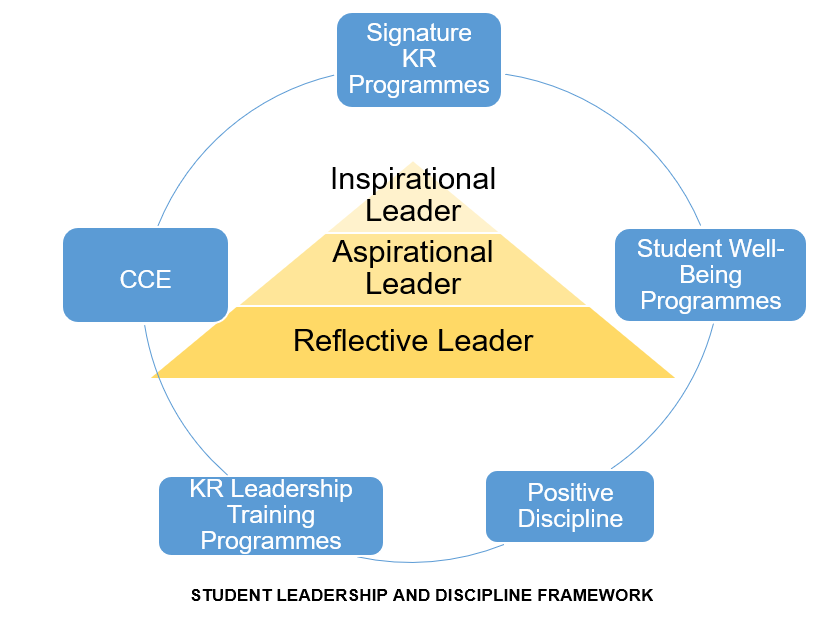Student Development Team
Overview
The Student Development Team, comprising of the CCE Committee, Student Leadership and Discipline Committe, SEN Committee and the Year Heads support the realisation of the school’s vision and key strategic thrust of Holistic Development of students through its approach of explicit teaching and experiential learning.
CCE Curriculum
Character and Citizenship Education Curriculum
Explicit Teaching
1. Character and Citizenship Education Lessons
Lessons are taught weekly with the aim of achieving the four enduring CCE 2021 goals. With CCE 2021, we aim to develop our students with:
a. Good Character: anchored in sound values, be able to think critically, ethically and to make discerning judgments and take responsibility for choices and actions
b. Resilience and Well-Being: to remain resilient when facing challenges and are able to form healthy relationships and have a sense of gratitude which will contribute to their well-being
c. Active Citizenship: students stepping up to contribute to people around them and the nation as well as
d. Future Readiness: students having a sense of purpose in their lives and to be equipped to take on the challenges of the future
The CCE Curriculum Content is based on the three big ideas of Identity, Relationships and Choices. It comprises the learning of core values, social-emotional competencies, and citizenship dispositions, with a focus on developing a sense of purpose in our students. These fundamentals are woven across content areas of National Education (NE), Sexuality Education (SEd), Mental Health (MH), Education and Career Guidance (ECG), Cyber Wellness (CW), and Family Education (FE), in ways that are age-appropriate and meaningful for our students.
2. CCE2021 Implementation
Key SDEs are designed to achieve CCE Learning Outcomes and 21st Century Competencies.
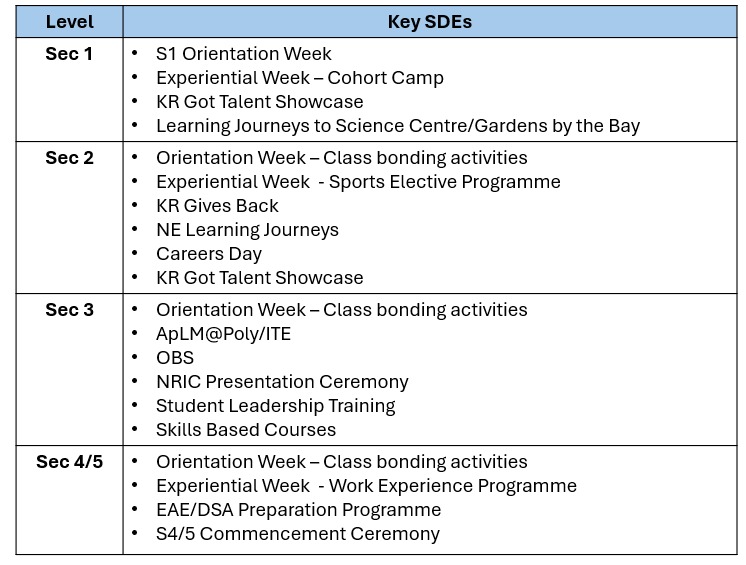
3. Education and Career Guidance
Education and Career Guidance is a developmental process which facilitates the acquisition of knowledge, skills and values needed to make informed decisions at key education stages to successfully transit from school to further education or work. Through ECG, social emotional competencies and qualities of proactivity, adaptability and resilience are developed to prepare students for the demands of the future workplace. The ECG curriculum focuses on exploration and helps students understand themselves better and guide their exploration of different education and career pathways.
Students learn to:
- Be more aware of their skills, interests and abilities.
- Manage relationships with people who have influence over their decisions.
- Explore relevant courses of study.
- Understand careers in different sectors.
The ECG curriculum is delivered as part of the Character and Citizenship Education syllabus. Students will receive at least four hours of ECG lessons each year.
Organised ECG Programmes include:
- ECG counselling by ECG counsellor
- Class/cohort-based ECG workshops by ECG counsellor
- DPA, DSA, PFP, EAE talks for graduating classes by Institutes of Higher Learning
- Learning journeys to Institutes of Higher Learning
- Learning booths by Institutes of Higher Learning
- Career Talks by industry professionals
4. Values in Action Programme – KR Gives Back
The school’s Values in Action (VIA) Programme is learning experiences that support students’ development as socially responsible citizens who contribute meaningfully to the community, through the learning and application of values, knowledge and skills. VIA fosters student ownership over how they contribute to the community. As part of VIA, students reflect on their experience, the values they have put into practice, and how they can continue to contribute meaningfully.
The school’s KR Gives Back (KRGB) programme provides students with the experiential learning opportunity through customised VIA level activities to live out their values, skills and SE competencies.
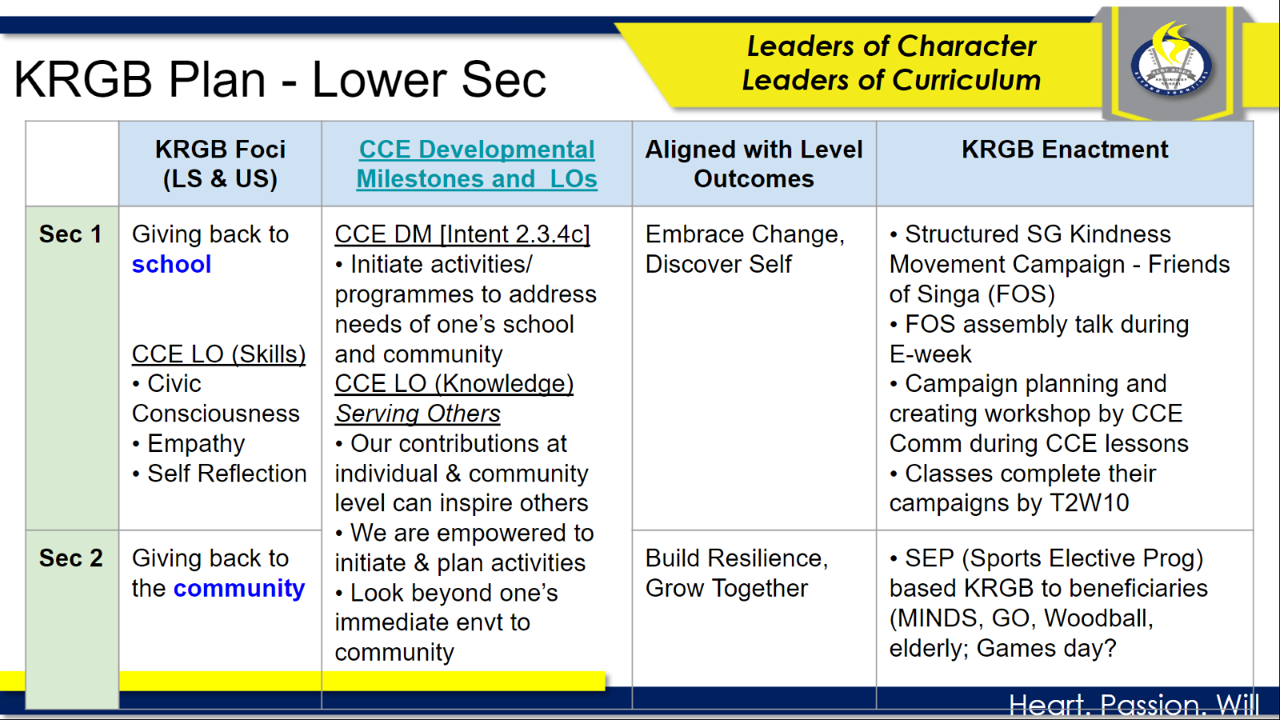
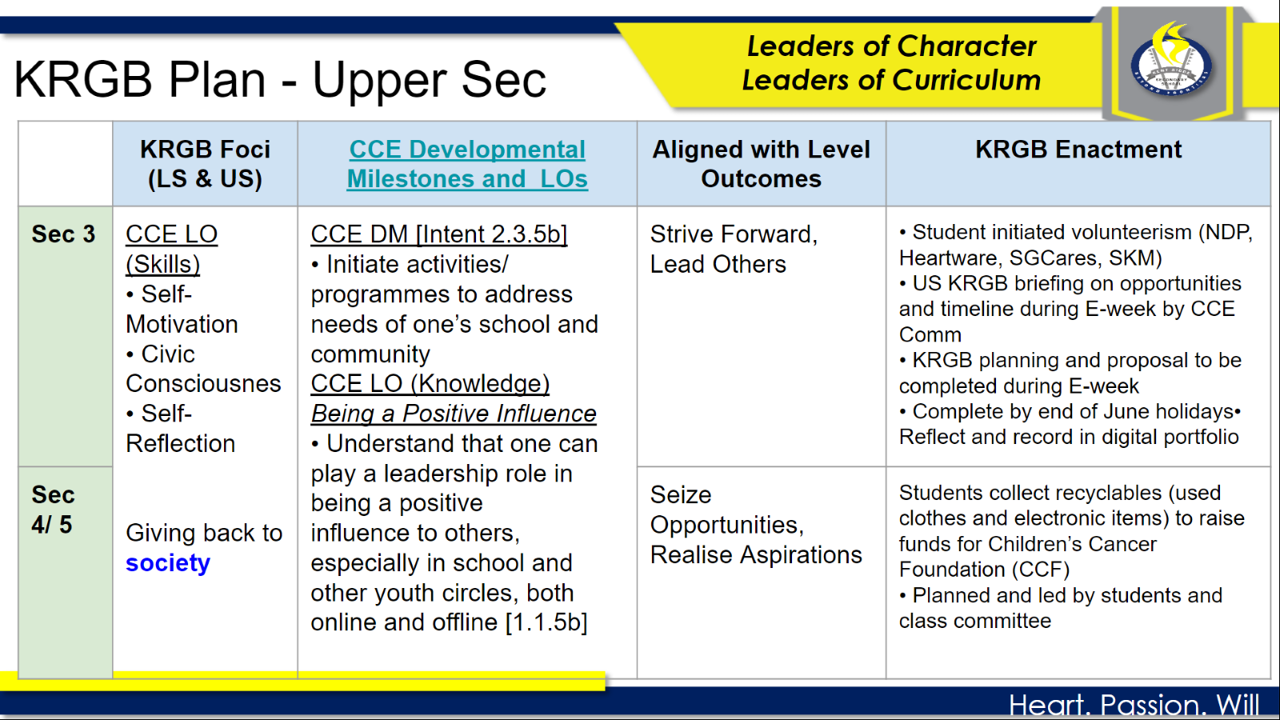
5. GEAR-UP @ KR
To support the School’s Key Strategic Thrust 1 of Holistic Development of Students, the school has an extensive GEAR-UP programme which targets different segments of students with varied profiles, interests, strengths and needs. GEAR-UP @ KR aims to engage Kent Ridgeans in meaningful after-school engagement programmes to develop useful core skills and competencies, build positive relationships with their peers, mentors and teachers while deepening their passions so that they can strive towards achieving their aspirations. GEAR-UP @ KR adopts the SOAR (Skills, Opportunities, Achievement, Recognition) approach to engage students in meaningful activities. They are:
(a) KR Lighthouse
The programme aims to
- provide a conducive environment for engaging students in school after curriculum hours;
- allow opportunities for befriending and relationship-building among students, peers, adult volunteers, school personnel and with KR Lighthouse staff; and
- provide opportunities for learning of social and life skills.
(b) STARChef
The programme aims to
- engage and challenge students through an energising after-school culinary skills training;
- deepen students’ keen interest in culinary skills
- develop students to be confident individuals who are conscientious of their own strengths and capabilities.
(c) D’Strykers Girls
The programme aims to
- utilise football as a platform to impart life skills to students;
- constructively engage the students after-school in a healthy interest; and
- encourage positive relationships between the students as a team.
(d) Youth COP
The programme aims to
- enhance youths’ awareness and knowledge of laws and crime prevention and
- raise youths’ resiliency with life skills and competencies.
(e) The Scaffold Programme (TSP)
The Scaffold Programme (TSP) is a student leadership development programme that seeks to inspire students at an early stage to achieve desired school outcomes. In line with GEAR-UP, TSP is specially designed for the newly recruited Secondary 1 GEAR-UP students which focuses on nurturing students’ character and competence as a leader, with emphasis on aspects such as social emotional competencies and youth development focusing on Connection, Confidence, Character, Competence, Care and Contribution. TSP also aims to strengthen students’ positive orientation towards their future through group work sessions. The newly recruited Secondary 1 GEAR-UP students will experience a common curriculum before they are engaged in customized GEAR-UP programmes based on their profiles, needs and interests.
Student Leadership and Discipline
Student Leadership Overview
Student Leadership and Discipline in KRSS is guided by the philosophy of “Every Kent Ridgean A Leader. Every Student Leader a Peer Support Leader”. The school adopts the Kouzes and Posner’s Five Practices of Exemplary Leadership model to develop a comprehensive leadership programme, targeted at the general school population while providing specialized training for student leaders throughout their journey in Kent Ridge. With this end in mind, the student leadership and discipline committee serves:
• To provide a platform for all Kent Ridgeans to develop self-management skills
• To provide necessary training for all KRSS student leaders to complement the job specific training so that they will attain the progression, espoused in the student leadership and discipline framework
• To provide opportunities for all KRSS student leaders to apply what they have learnt
• To drive school culture and student agency through leadership development
Kent Ridge Secondary School believes in equipping all Kent Ridgeans with broad-based leadership development to develop self-leadership skills, required for reflective leader. This will allow all Kent Ridgeans to develop self-management skills to manage their behaviour and lead themselves according to the expectations set forth for all Kent Ridgeans. This development is achieved through various co-curricular platforms such as CCE lessons, student well-being programmes and cohort experiences such as Experiential Week and Orientation Week.
Various leadership opportunities are provided for Kent Ridgeans who are interested in developing their leadership competencies in different areas. This will allow them to discover their aspirations and work towards being an aspirational leader.
| Safety and Security | School Culture and Student Agency | Student Well-being |
|---|---|---|
| - School Safety Ambassadors | - Student Councillors - CCA Leaders |
- Class Committee - Sports Leaders - Gear-up Leaders |
On top of the job specific training, Kent Ridge provides leadership training development programmes at specific level to equip them with the necessary competencies and skills so they will progress to be competent and resilient leaders. These trainings will also develop them to be effective mentors for the junior leaders and work towards being an inspirational leader for all.
| Level | Programmes |
|---|---|
| Secondary 1 Students | - Leadership Experience Programme (for Student Council, Gear-up Leaders and Sports Leader) |
| Secondary 2 Student Leaders | - Peer Support Leaders Training - Level 1 Facilitation Strategies |
| Secondary 3 Student Leaders | - Level 2 Facilitation Strategies - Cultural Immersion Exchange Programme - KRSS Student Leaders Retreat |
| Secondary 4 Student Leaders | - Mentorship Programme |
Student Leaders will be offered opportunities to sign up for external programmes such as Model United Nations to further hone their competencies.
Examples of Authentic Leadership Development Platforms
| Platforms | Description |
|---|---|
| Orientation Week | Orientation Week provides an opportunity for student leaders to apply their facilitation strategies to lead in welcoming the Secondary 1 students. They plan and implement the orientation programme for the Secondary 1 students. |
| Experiential Week | Experiential Week provides every student with the opportunity to acquire leadership skills. An example will be during the E-week level camps, students put what they have learnt into practice. Teachers share their observations, conduct debriefs and provide feedback to their students. |
| School Operations, Events and Celebrations | Student Leaders are given experiential learning opportunities to develop their leadership potential by planning and managing school celebrations with their respective leadership group teachers’ in-charge. |
Discipline Committee
Disipline Committee Overview
As part of the broad-based leadership development for all Kent Ridgeans, discipline is seen as a means to an end to understand the required expectations. This will allow all Kent Ridgeans to understand and internalize the expectations as to allow them to manage themselves accordingly.
With this intent, Kent Ridge Secondary adopts positive discipline and restorative practice as the whole school approach to setting expectations for all Kent Ridgeans. This drives the school in developing the following discipline philosophy:
• Students learn well when there is order and discipline. At the same time, they need care, encouragement and space to learn from mistakes and improve.
• Discipline is an educative process, and the goal is to instil self-discipline and good character in students.
• Disciplinary measures serve as a proxy for consequences of the poor choices made. It is not punishment, and must be meted out fairly, firmly, and appropriately.
Student Support Programmes
1. Social and Emotional Well-being
Student support structures in this aspect include Individual Counselling Support, Secondary 1 Transition & Engagement Programme, Emotional Literacy Programme and Secondary 4 Stress Management Programme.
Students are equipped with knowledge, skills and tips to manage self, support their peers facing challenges as well as know the different avenues to seek help.
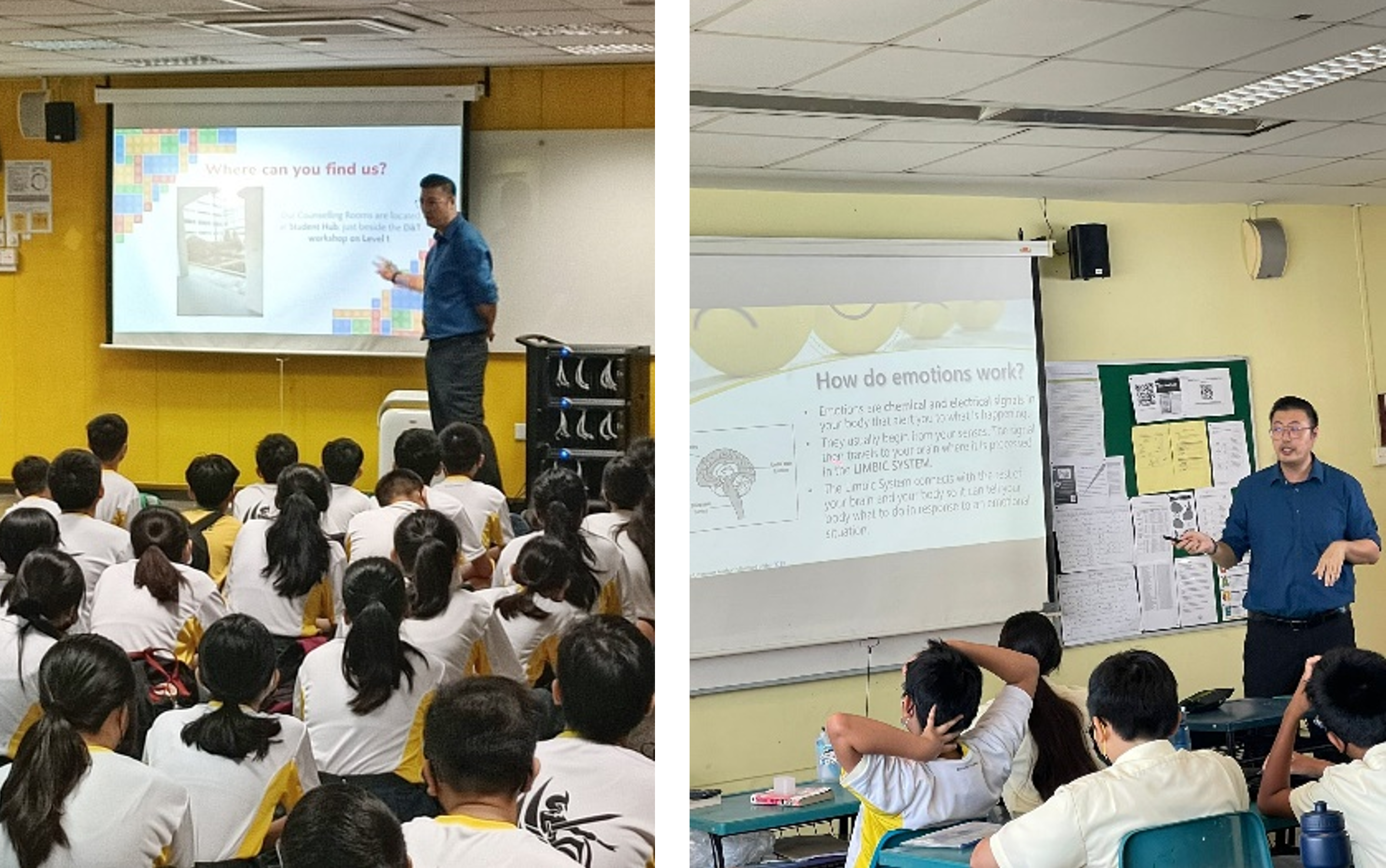
2. Physical Well-being
The Student Health Advisor (SHA) programme is run by a qualified and trained allied health professional who provides guidance to students with health-related issues so that timely intervention and referrals can be made. For more information, kindly click on this link.

3. Financial Assistance Programmes
Financial needs of students are identified and supported through various schemes, bursary applications and referrals to school partners.
4. Special Educational Needs Support Programme
We believe that every individual has unique potential and deserves the opportunity to thrive in an environment of mutual respect and understanding. Our aim is to create an inclusive school where every student can participate and learn effectively.
Learning and Behavioural Support for students with Special Needs is provided in the form of formal/informal assessment, in-class support and individual/small group intervention support.
The team also plans schoolwide and customized programmes to cater to the needs of different student segments.We also partner stakeholders to create awareness, develop capacities and promote inclusivity.
a. Individual/Group Support Programmes
Learning and Behavioural Support
Intervention and support are provided based on the needs of students in the areas of Literacy, Social Emotional and Behavioural challenges. Interventions are carried out through individual or group sessions. Through collaboration with various stakeholders such as parents, teachers and external agencies, students learn skills and strategies to help them achieve personal and academic goals.
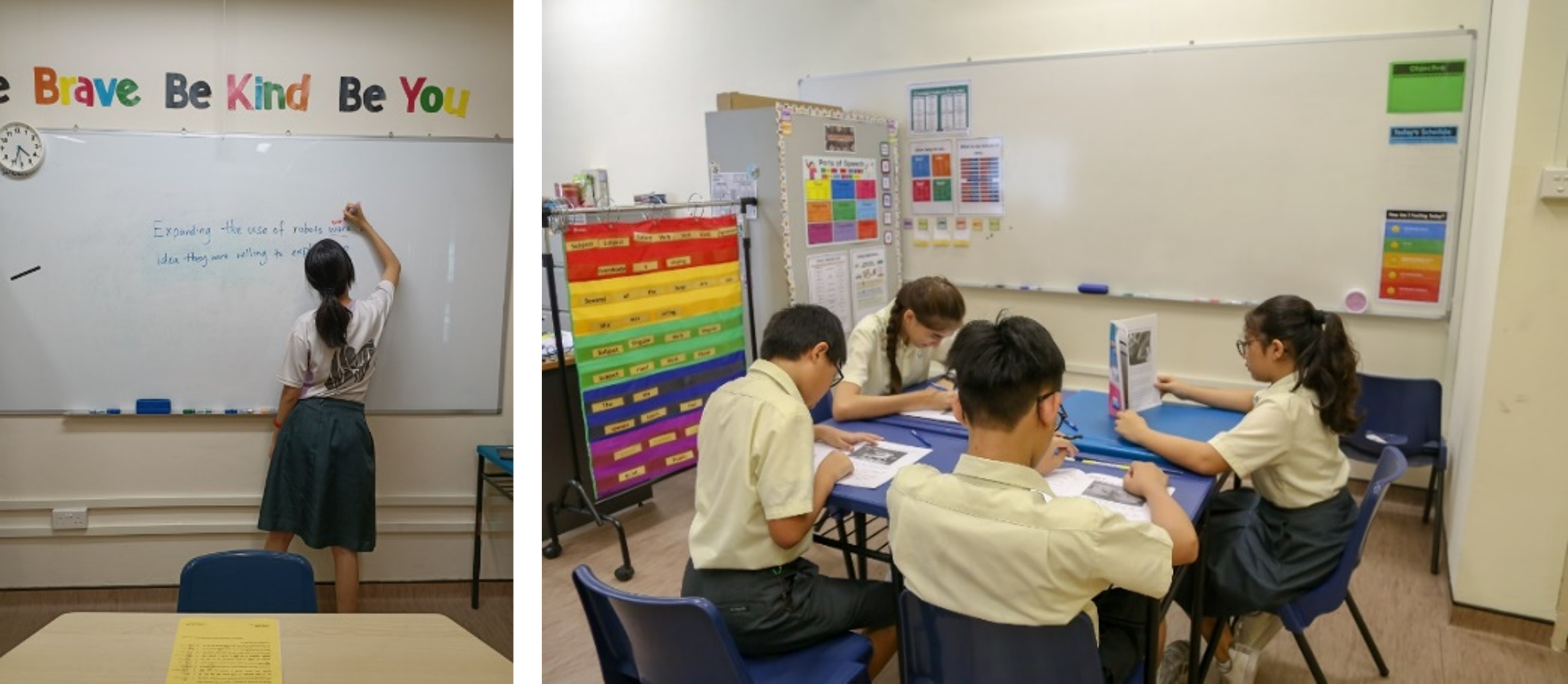
i. Language & Literacy Support
Students who require literacy and language support have various strengths that can be enhanced, and learning gap that can be improved. Intervention and support for them may include: Reading Fluency, Comprehension Skills, Spelling and Writing Skills.

ii. Social & Behavioural Support
Students with social and behavioural difficulties may be engaged in individual, peer or group sessions to learn skills and strategies. Intervention support for them may include: Emotion Regulation Skills using Zones of Regulation, Facing Your Fear Programme, Circle of Friends and Self-management programme.
b. Customised Programmes for students
• Sec 1 Student Induction Programmes
Through the induction programme, students get to know one another, understand school processes and programmes as well as learn the different areas in the school where they can seek help from the Student Support Team.

• Study Skills, AA Exam Briefing & Preparations, Social Skills & Self-Management Programmes
Through the various programmes, students learnt skills and strategies to better manage themselves in their learning and peer relationships. The programmes also allowed students to work in teams and forge greater bonds with other SEN students across the levels.

c. Schoolwide Programmes/Activities - Knowing Me, Knowing You
To create awareness and promote empathy and peer support for an inclusive school culture, students learn about some of the challenges that their peers may experience through the simulation activities and information sessions. They also learnt ways to be understanding, accepting and helpful to their peers who may face challenges in school
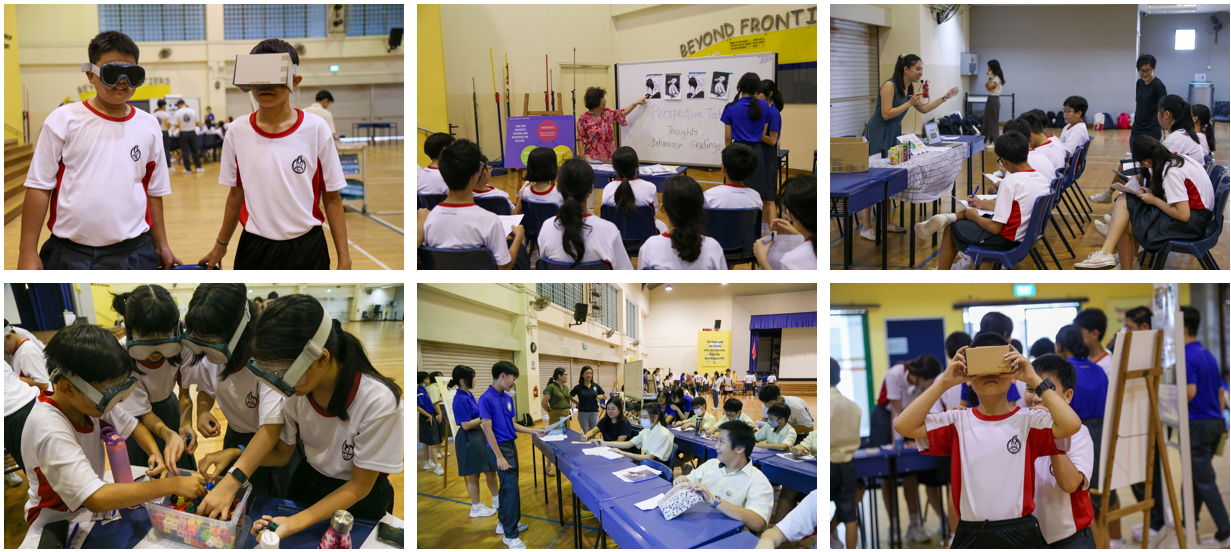
d. Partnership
Parents Induction
Sec 1 parents are invited to a session where SEN Team share about the SEN support provided by the school. The briefing session aslo creates an opportunity for greater collaboration between parents and school as we support students with SEN to have a smooth transition to secondary school.



